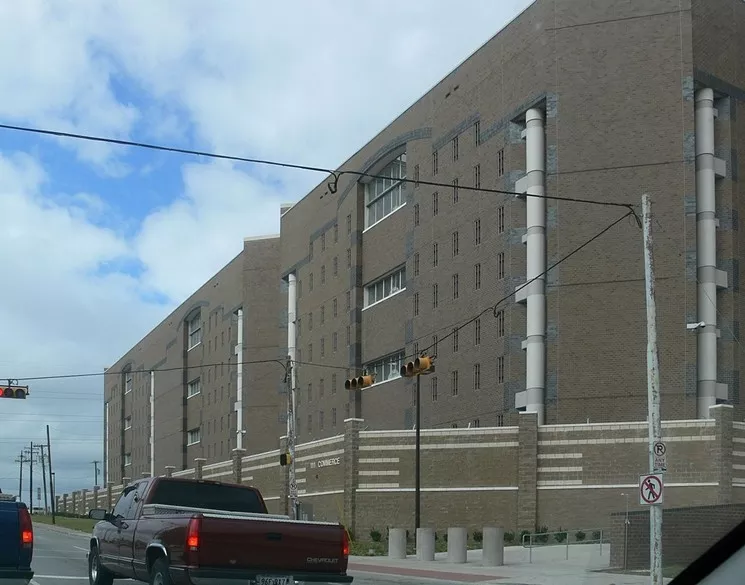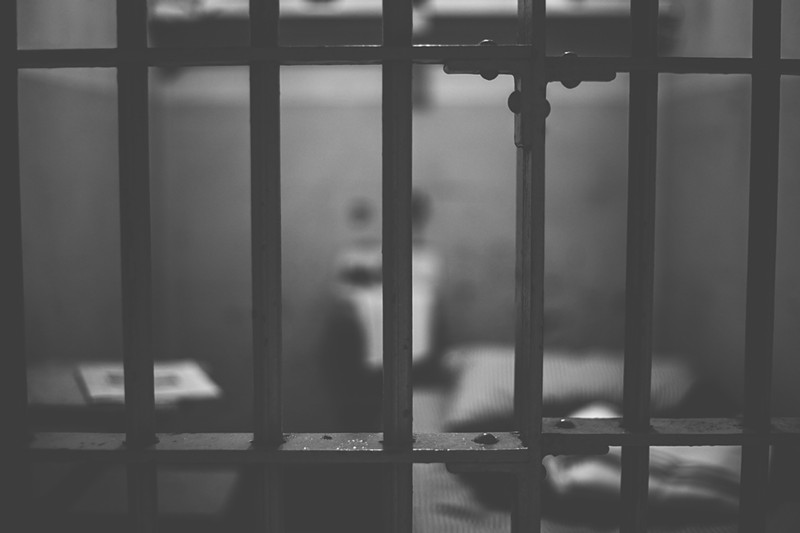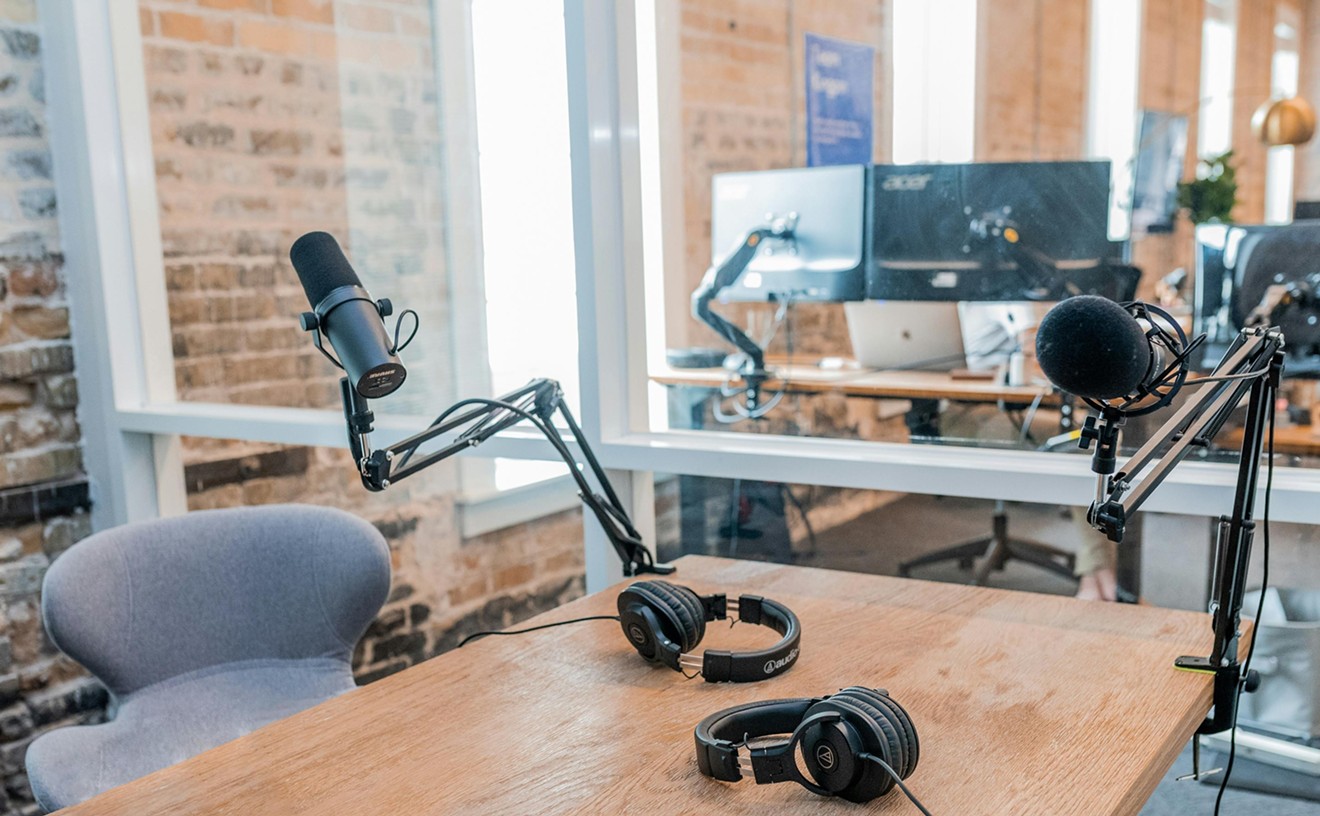Since then, the unit has endured a litany of controversies. In 1996, 21-year-old inmate Daniel Miguel Avellaneda was shot and killed by a guard. The guard claimed Avellaneda was running away and that the fatal shot came after sufficient warning. Other inmates claimed Avellaneda stopped running, turned to face the guard with his hands raised and was shot at point-blank range. The bullet hit Avellaneda between the eyes. The guard was cleared of all charges. A group of inmates filed a grievance with prison officials, who replied, tersely, "The treatment of other inmates is none of your concern.”
Contempt for inmates — or the perception thereof — is now at the center of several ongoing legal battles in Texas as inmates worry about the spread of COVID-19 in jails and prisons across the state.
The Robertson Unit’s secluded location could not keep the coronavirus from breaching its walls. According to an anonymous inmate within those walls, the prison staff’s response to the virus has disregarded inmate safety. A man imprisoned at McConnell Unit, a maximum-security prison an hour north of Corpus Christi, shared similar concerns.
Speaking on the condition of anonymity, the inmate, a worker in McConnell’s garment factory, said inmates have been tasked with making face masks. He says those masks have been used by the guards but not by inmates. A spokesman for the Texas Department of Criminal Justice said McConnell inmates have indeed been allowed to wear face masks but did not specify when that decision went into effect.
Following the news of five positive cases of COVID-19 within the jail’s walls, a group of Dallas County Jail inmates filed a federal lawsuit against Sheriff Marian Brown. The suit demands tighter COVID-19 guidelines and the release of inmates who are 50 or older. Last week, 153 inmates had tested positive for the disease.
These concerns from inmates come at a time when health experts are warning of the impact the coronavirus can have in jails and prisons.
Lawyers and advocates argue that this isn’t solely an inmate issue. It’s a public health risk. An April 22 report predicted that deaths from COVID-19 could be 100,000 higher than projections indicate if jail populations aren’t sharply reduced.
Given the cramped, often unsanitary environment of correctional facilities across the country, experts and prison officials have referred to prisons and jails as “petri dishes” for the virus, which has claimed more than 650 lives in Texas. In a recent interview, criminal defense lawyer and Georgetown Law professor Abbe Smith said corrections officials are not responding to the COVID-19 pandemic with enough urgency.
“Second only to nursing homes, jails and prisons are incubators for disease,” Smith says. “Law enforcement in general seems to be resisting release of significant numbers of inmates.”
Smith argues that the best defense against COVID-19 is releasing some prisoners. Decisions like that must be decided by the courts, but lawyers in Texas argue Gov. Greg Abbott is robbing the courts of that discretion.
The Dallas lawsuit is just one of many suits calling for the release of medically vulnerable prisoners, a practice strongly opposed by the governor. Refusing to release prisoners, these lawsuits warn, could have disastrous results. Yet instead of heeding these pleas, Abbott is making it more difficult to get out of jail. His response has raised larger questions about the state of criminal justice reform in Texas, and more specifically, the state of bail reform. Meanwhile, prisoners across the country are still being asked to manufacture face masks. As they help protect others, inmates and their lawyers are wondering who will protect them.
Who Belongs in Jail?
Just after midnight on Wednesday, a 54-year-old woman was arrested in Tom Green County in West Texas. She was booked into the county jail on $31,000 bond. To attorney and law professor Pam Metzger, this is an abomination.“It’s mystifying to me what public safety is protected by locking someone up when you are potentially exposing her to a highly contagious virus,” she says.
Metzger, an accomplished legal scholar, is the director of the Deason Criminal Justice Reform Center at Southern Methodist University. She is primarily concerned about the practices in county jails scattered throughout the state. Metzger and the center's staff have been examining the types of offenses that are resulting in arrests during the pandemic. She cites another example of a man in Montgomery County who was arrested for failing to provide his name after a car accident. The man spent eight days in county jail.
While sheriff’s offices in counties like Dallas and Collin have instructed officers to avoid bringing Class C misdemeanor offenders to county jails, officers are still exercising their individual discretion. As always, it’s up to them to arrest or not arrest an offender. A Dallas Police Department spokesman was vague on how exactly officers have changed their tactics while the city is under a shelter-in-place order.
“I think it’s fair to say that officers are using discretion in handling low-level offenses," he said.
Metzger is worried that officers across Texas are employing a “business as usual” approach at a time when the status quo could lead to a dramatic spike in the COVID-19 death toll.
“All of the national media is focused on the national centers like Rikers Island, but the truth is, most people are going to be incarcerated in local jails,” Metzger says. “By and large, the people we arrest are poor, they have limited access to healthcare, they have preexisting conditions and they are crammed into facilities that are built to hold people for a short period of time. Jails are not meant to test or treat people.”

Dallas County's Lew Sterrett Justice Center. Close quarters and little social distance.
Andres Praefcke
The ACLU is part of the inmates’ legal team, and it’s not the organization’s first tangle with Dallas County. In 2018, they filed a lawsuit that called the county’s preset bail practices unconstitutional. Poor inmates will inevitably plead guilty, the suit argues, because it’s the fastest way out of jail. Otherwise, faced with a high money bail they can’t pay, inmates sit in jail, possibly losing their jobs and families. Now, they’re facing a rampant virus, too.
“We’re seeing people locked up, and an arrest and even a brief incarceration could be a death sentence,” Metzger says.
She argues that now is the time to limit the people entering jail, which, according to Dallas County records, they may be doing. As of April 20, the Lew Sterrett inmate population was 4,883, down from 5,978 a month earlier. The Dallas County website lists the jail’s maximum population as 7,100. Nevertheless, the inmates’ lawsuit argues that the jail’s conditions endanger its populace.
In a virtual hearing on April 22, a man named David Jones testified about his time in Lew Sterrett. Jones told Judge Ada Brown that social distancing is impossible in the jail, and that inmates were not given any personal protective equipment when they were asked to clean cells. Jones’ pod, which housed more than 50 men, included one man who became visibly sick, vomited and was later moved to the infirmary. The inmates’ testimony was buttressed by a Dallas County detention services officer, who told the judge that officers were instructed not to wear face masks because “it might spook the inmates.”
The Dallas County Sheriff’s Office declined to comment for this story, citing pending litigation. A spokesman highlighted initiatives recently published online, which mostly call for a continuation of the status quo and isolation for inmates with symptoms. Lawyer Abbe Smith told Georgetown Law that jail staffers have little authority to help their inmates, but they can advocate for them.
“[Corrections officials] could insist that prisons and jails have working sinks, soap readily available, other hand sanitizer dispensers throughout the institution, disinfectant for surfaces in cells and common areas, increased infirmary beds for those with coronavirus, more medical resources and staff, and protocols for social distancing, including no double or triple bunking in cells.”
Metzger argues that what little authority staffers have has been further limited by the state government.
“Criminal justice is profoundly local,” she says. “In Texas in particular, what the governor has done is tie the hands of judges and sheriffs, the people who are in the best position to judge what is right for their communities.”
Metzger is referring to Abbott’s March 29 executive order focused on local jails, which banned the release of anyone convicted of a violent crime and anyone accused of a violent offense or the threat of violence. In Metzger’s view, the order is broad, dangerous and a blatant overreach by the governor.
“If I was arrested 30 years ago because of a bar fight and I was in jail today for lottery fraud, I’d be stuck in jail,” she says.
In other words, people who arguably do not belong in jail — particularly in the midst of overwhelming health concerns — will be kept in jail if they have even an accusation of violence on their criminal record.
“The harms of this order are not abstract,” wrote Amanda Woog, executive director of the Texas Fair Defense Project, in a statement. “Poor people are being detained pretrial with no way to escape a possible jail outbreak.”
Abbott disagrees. In an interview with The Texas Tribune, the governor said his order "doesn't focus on how deep somebody's pocketbook is. It has to do with how serious the crime they committed."
In an early April press conference, he argued that releasing inmates would create an even greater public risk, not a lesser one. Yet even if one were to somehow disregard arguments of public risk, Metzger says the order is a clear violation of checks and balances, rendering it unconstitutional.
In an April 21 letter to the governor’s office, Metzger and eight defendants’ rights organizations asked the governor to rescind the order, citing the cascade of irreparable harm it can cause to poorer communities.
“[This order] places wealth and access to wealth as the determining factor of pretrial liberty,” the letter reads. “With the far-reaching impact of the COVID-19 pandemic on our nation’s jail and prison systems, considerations should be given to state and local efforts that will reduce incarceration populations.”
Judges in Harris County joined the ACLU to sue Abbott, and on April 10, a judge in Austin temporarily blocked the order. But on Thursday, the Texas Supreme Court reinstated Abbott’s original edict, restricting latitude for judges across Texas.
The way attorney Jessica Pishko sees it, Abbott’s move is political — and it brings further harm to the ongoing fight for bail reform.
“The order is annoying,” she says. “It’s not clear, and because it’s not clear, that will lead to inaction. Folks won’t move forward, because they don’t want to piss off the governor.”
The Battle Over Bail
Pishko is senior counsel at The Justice Collaborative, a team of lawyers, researchers and journalists. According to the organization’s website, “[their] mission is to bring human dignity and restraint to a flawed criminal justice system.”Pishko is passionate about bail reform, a movement she says is often misunderstood.
“The bail reform debate is largely led by fear-mongering,” she says. “People are anxious that people will be released who should not be released.”
In reality, she says, bail reform advocates are fighting for people who are not dangerous, yet are confined to jail by their bank accounts.
“These are people who, if they have the money, would pay their bail and get out,” she says. “These are people who we can safely release if they could pay, and we’re talking about folks who can’t scrimp together $1,000.”
Abbott has repeatedly referred to inmates as “dangerous criminals,” but Metzger and Pishko say that is often far from the case. Metzger argues that Abbott’s order is a step in the wrong direction. In her opinion, the governor has previously been on the right side of the criminal justice reform movement.
“What’s so tragic about this order is that it threatens to undo all of the work people have done to establish Texas as a model for what criminal justice should look like, which is safe and sustainable,” she says, pointing to Abbott’s work on behalf of survivors of domestic violence and human trafficking.
Pishko disagrees, arguing that, while disappointing, Abbott’s recent actions are on brand for a governor who is, in her opinion, “no friend of criminal justice reform.”
“His measures have been watered down and weak,” she says. “He says he’s made it easier for people to file for clemency, but you still have to apply for clemency. He added a form for you to fill out. This is in no way revolutionary. We still have jail victims.”
Despite disagreeing on Abbott’s legacy, Pishko shares Metzger’s concern that judges, sheriffs and district attorneys have been handcuffed by the governor’s executive order. While Texas sheriffs do not have the authority to simply release inmates unilaterally, district attorneys do have the power to generate lists of inmates who may be eligible for personal recognizance bonds, which grants inmates release without paying a cash bond. District attorneys can then hand that list to judges, who can theoretically rule in favor of a release.
Yet just how willing judges will be to do that remains to be seen. There are signs that Dallas District Attorney John Creuzot is in favor of limiting jail populations and releasing inmates on personal recognizance bonds. In an email exchange, Creuzot confirmed that he is identifying people who can be released via that route, but noted that the ultimate release is out of his hands. He also declined to confirm exactly how many people he is considering for possible release.
“We present evidence and they [the judiciary] agree or not,” he wrote. “Also, the judiciary will decide what, if any, conditions of bond may be appropriate.”
It is worth noting that Creuzot joined the district attorneys of Bexar, Nueces and Fort Bend counties to sign an amicus brief that, in effect, calls Abbott’s order unnecessary. One section of the brief presents evidence arguing that money bonds do not reduce the risk of re-offending. But it's unlikely that this will affect Abbott’s stance. The battle to release prisoners will play out not just in the courtroom, but also between the sheriffs and judges who side with the governor and those who do not.
Pishko predicts that this battle will continue to be fought across party lines. It is no coincidence, she says, that the bail bond industry is a source of major political donations. But it is disheartening to see a battle like this only serve to further entrench people in their respective party foxholes, because, as she notes, “Most criminal justice reform in Texas has been bipartisan.”
“Look at the Clay Jenkins spat,” she says. “Why would Governor Abbott pick a fight with Clay Jenkins? Because Jenkins is a Democrat. Why is he picking a fight in Harris County? Because they just elected a whole bunch of Democrats.”
Democrats like Creuzot may advocate for the release of certain inmates, but that decision may fall to a conservative judge. Furthermore, Democrats already appear to have lost a potentially significant source of support: Sheriff Brown.
On April 15, the Democratic sheriff asked Judge Brown to toss the inmates’ lawsuit, effectively arguing that the sanitation efforts already underway in the county jail will be sufficient protection against COVID-19. Abbott and Attorney General Ken Paxton agreed with Sheriff Brown, who is facing a Republican opponent for reelection later this year.
In a brief, Abbott and Paxton wrote, “Releasing such individuals during the coronavirus pandemic presents a ‘target rich environment’ for criminals to exploit as businesses are closed.”
To Pishko, the concern for business is not surprising.
“The governor is worried about business,” she says. “And fear is bad for business.”
On April 27, following a week of testimony, Judge Brown denied the inmates entreaty for release. She did not cite specific factors for her decisions, other than to say that an explanation will be forthcoming. ACLU lawyer Andrea Woods said she was "disappointed and concerned for [her] clients," and that she doesn't know what is next. But she has no intentions of giving up yet.
In late April, a family member of an inmate at Beto Unit, a prison in East Texas, said it was “draining” to think about what inmates are experiencing. The unit has 128 confirmed cases of COVID-19.
“One of our plaintiffs' oxygen levels has reached dangerously low points in the jail,” Woods says. “A lot of them think that they’re going to die. A lot of them may die. That haunts me a little bit.”
Woods also related the story of a Dallas man who fell ill with COVID-19 while incarcerated in the county jail. He sought and received a bail reduction, but according to Woods, the man’s wife had to sell her wedding ring to make her husband’s bail. Nevertheless, her husband was still in county jail six days after he made bail. The pretrial services department refused to fit him with an ankle monitor.
“One of the pretrial services officials said something to the effect of, ‘If he hadn’t been out there committing crime, he wouldn’t have been in jail to catch COVID-19,’” Woods says. That behavior is part of what Woods calls the “callousness” of the criminal justice system.
“We’ve inherited a system that is built to ‘other-ize’ people,” she says. “We call people ‘inmates’ instead of people. We call meals ‘feeding times’ instead of meals. It’s heartbreaking and immoral the way we conceive of people who are incarcerated.”
Woods also related the story of a Dallas man who fell ill with COVID-19 while incarcerated in the county jail. He sought and received a bail reduction, but according to Woods, the man’s wife had to sell her wedding ring to make her husband’s bail. Nevertheless, her husband was still in county jail six days after he made bail. The pretrial services department refused to fit him with an ankle monitor.
“One of the pretrial services officials said something to the effect of, ‘If he hadn’t been out there committing crime, he wouldn’t have been in jail to catch COVID-19,’” Woods says. That behavior is part of what Woods calls the “callousness” of the criminal justice system.
“We’ve inherited a system that is built to ‘other-ize’ people,” she says. “We call people ‘inmates’ instead of people. We call meals ‘feeding times’ instead of meals. It’s heartbreaking and immoral the way we conceive of people who are incarcerated.”
In a phone call with his family member, the inmate was scared and desperate. The inmate told his relative he has been confined to his cell 24 hours a day, with the exception of five minutes for a shower.
“These systems were meant to dehumanize, and we can't leave anyone behind,” the inmate’s family member said. “If we don’t take the time to acknowledge the humanity in these times, there will be nothing left.”











